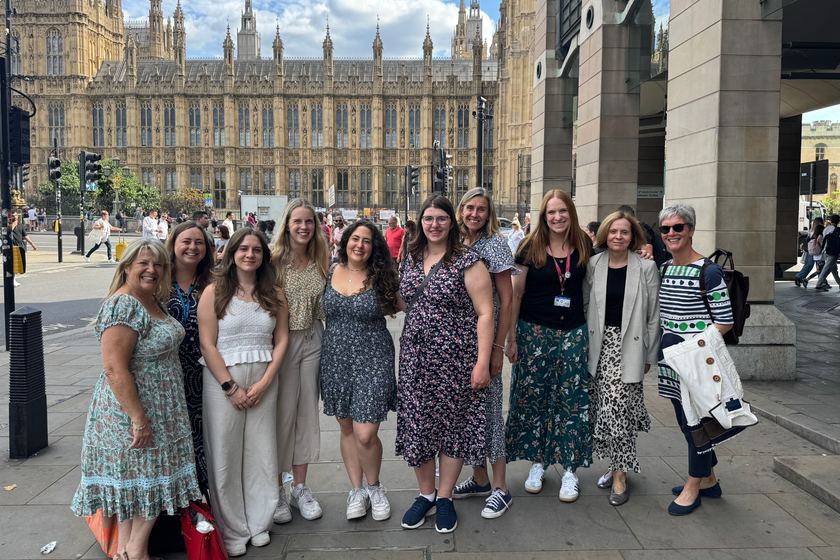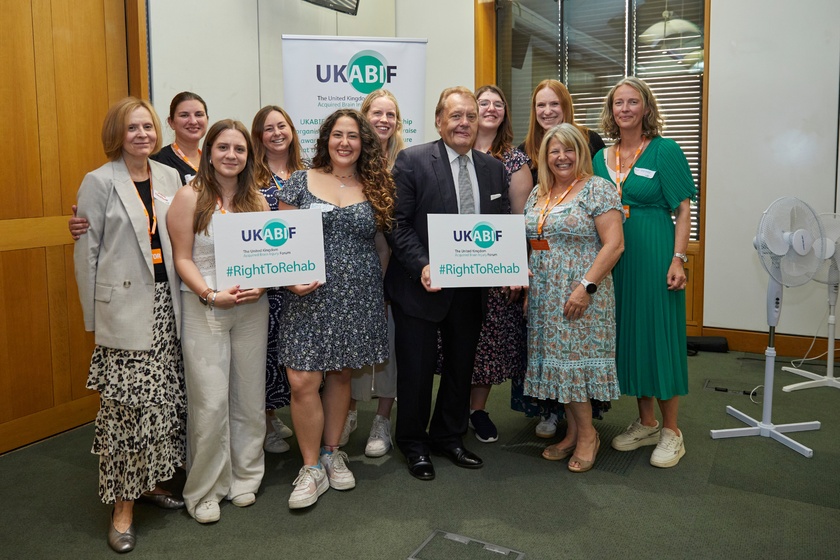An exemplar model of care that illustrates the Cambridge Children’s Hospital ambition of a ‘whole child’ approach, with care closer to home, is influencing the development of a UK-wide Acquired Brain Injury strategy.

Representatives from CPFT’s Cambridge Centre for Paediatric Neuropsychological Rehabilitation (opens in a new tab) (opens in a new tab) (CCPNR) and Psychological Medicine team at Addenbrooke’s Hospital joined others in advocating for the importance of ongoing specialist care for children and young people with Acquired Brain Injury (ABI), from early intervention on the hospital ward to specialist neuro-rehabilitation in the community.
The All Party Parliamentary Reception aimed to highlight the Government’s commitment to an ABI Action Plan and the publication of the ‘Right to Rehab’ report. A House of Commons debate on the subject is due to be scheduled in the Autumn.
The ethos of the CCPNR, where specialist physical and mental healthcare is provided together, alongside specialist consultation to the community, is core to the vision of Cambridge Children’s Hospital. Run by Cambridgeshire and Peterborough NHS Foundation Trust (CPFT (opens in a new tab)) with in-reach to Addenbrooke’s Hospital (CUH), the CCPNR provides a bridge from acute care into the community. Rehabilitation is goal-centred and helps children to participate in education, peer relationships and develop their independence. Working with community health and social care partners, closer to the young person’s home, the interdisciplinary team at the CCPNR helps the child or young person to be as independent as possible, as well as delivering psychological interventions, adapted to their needs.
The ABI pathway and the specialist assessment, interventions and regional consultations offered by the CCPNR, helping young people and families to recover and thrive after brain injury, are perfect examples of the Cambridge Children’s Hospital ambition to deliver psychologically and family informed care, closer to home. They demonstrate the value of early intervention and prevention, integrating physical and mental health, and the whole child approach.
Sara O’Curry, Joint Head of Psychological Medicine, Cambridgeshire and Peterborough NHS Foundation Trust

Chaired by Sir John Hayes MP, the reception brought together parliamentarians, researchers, campaigners, people with lived experience of ABI, and clinicians.
Gemma Costello, CCPNR’s Clinical Lead , and Sara O’Curry, Head of Psychological Services for Paediatrics (CPFT, CUH, NWAFT (opens in a new tab)) shared information about the East of England ABI pathway that is currently in place, highlighting the cost effectiveness of timely neurorehabilitation and explained how commissioning arrangements have the potential to be replicated nationally.
We were delighted to attend this event and represent the East of England pathway, as the only service in the UK that has an ‘end to end’ pathway from PICU through to community rehabilitation.
Gemma Costello, Clinical Lead, CCPNR
The CCPNR was set up in 2009, in response to Child and Adolescent Mental Health professionals in Cambridge noting how many young people were struggling with their mental health and dropping out of school, having sustained a head injury many years before.
At the Parliamentary Reception, young people with lived experience of ABI spoke about the challenges of growing up in systems that don’t understand their needs and the huge impact on their families, and reflected on the process of rediscovering themselves after ABI.
Two years ago, Helen Whately, the former Minister of State for Social Care, and Sir Chris Bryant, MP for Rhondda and Ogmore, visited the CCPNR to hear from clinicians, parents and patients, as part of their work on the ABI Strategy. Afterwards, Helen Whately said, “The cost of having a service like this pays for itself many times over. It saves a huge amount of money for the NHS but also education and the prison services. It’s better for families to be at home with the right support.”
In the recent ‘Right to Rehab’ (opens in a new tab) report, it highlighted that ABI costs the UK economy £43 billion each year with wellbeing costs amounting to almost £92 billion. It flagged that neurorehabilitation yields a 16:1 return on investment. The report’s recommendations included a statutory right to rehabilitation in every UK community with dedicated funding mechanisms in place. The work will sit alongside the NHS 10 Year Plan (10 Year Health Plan for England: fit for the future - GOV.UK (opens in a new tab)).
Gemma Costello said: “We have been fortunate to attend recent round table events on ABI in education, as well as the APPG ABI reception. Presenting as part of, the National Acquired Brain Injury Learning and Education Syndicate, alongside community teams, young people and their families."
We are feeling inspired and motivated to continue to develop the offer in the East of England and support the ongoing aims of making positive change for children and young people with ABI nationwide.
Gemma Costello
- Cambridge Children’s Hospital (opens in a new tab) will work hand in hand with community partners, local hospitals and regional NHS trusts, as well as schools and social care, to support families closer to home. Digital and telehealth technology will allow us to support healthcare professionals from a distance and provide interventions where they’re needed most. Keeping our patients in the places they know, amongst the people and communities they trust, will lead to better outcomes.
